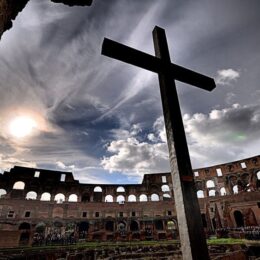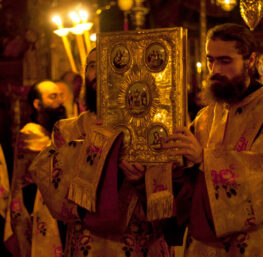Breakpoint Church Colson January 12, 2007
Atheists on the Offensive
Just a few months ago, I thought it was insulting to be called a “theocrat.” I was wrong. “Theocrat” is almost a compliment compared to what the Left is calling Christians now.
According to a New York Times review, we Christians are fascists—that’s what the Nazis were. And if we’re not stopped, we’ll try to take over America. It’s an illustration of how vicious the invective has become against faithful Christians.
“Of course there are Christian fascists in America,” writes Rick Perlstein in the New York Times Sunday Book Review. How else, for example, to explain the cadres who took former Chief Justice Roy Moore’s Ten Commandments monument on tour?
Perlstein was reviewing the latest in the recent crop of hate books about the Christian faith, this one titled, American Fascists: The Christian Right and the War on America, written by Chris Hedges. He details all the wacky killings, like the Aryan brotherhood over the last twenty-five years, and then concludes by saying that Christians are about to do the same thing. Talk about guilt by association.
. . . more




Colson is willfully misrepresenting the facts here. First, Chris Hedges, author of “American Fascists” is no athiest. He is the son of a Presbyterean minister and a former seminarian. Would an athiest be described like this?
http://www.salon.com/books/feature/2007/01/08/fascism/
Second, Hedges is not attacking Christianity, unless you consider Pat Robertson, James Dobson and Christian Reconstructionists or dominionists as representative of all Christianity. One could argue that Hedges depiction of right-wing Christian fundamentalism as a “fascist movement” is a little excessive. But to represent Hedges as an athiest attacking all Christianity, as Colson does, is just an out-and-out lie.
Comment on “Religion in America”.
What’s to say.
We have lots of people hearing from God, talking to God, talking in tongues, babbling on about shooting President Chavez and going to war; all of this and all of that about everything. I thought that the Holy Spirit was sent to guide us.
If one hears voices: the dead, the devil or in the wind they are bound for an institution.
When religion is used to guide a nation-theocracy-by overriding the democratic processes call it what you will. On October 7, 2005 reported by the BBC, President Bush told Nabil Sheath and Mahmoud Abass in June of 2003 that God told him to go and fight those terrorists in Afghanistan and than said ‘George go and end the tyranny in Iraq’. We now know that lies were fabricated to push the US into Iraq.
Did God say anything about the udder destruction of a country, massive death and dislocation and the rise of an aspostat religion?
When the Constitution is hacked to pieces because of voices, you choose the word to be used.
Sincerely, J R Dittbrenner
Note 1. Dean, the paragraph you quoted was intended to establish his credibility. Fine as far as it goes I guess. More interesting is his cultural analysis:
This is a caricature. Colson knows it. I know it. You should know it. It’s clear that the attempt is to portray Evangelicals as blind sheep following jack booted thugs. I’ve got my problems with Evangelicals but this is over the edge.
You will see more of this theme in the next two years especially in left-leaning journals such as Salon. It part of a broadside by the cultural left to recapture the moral high-ground by discrediting Christianity. The left senses a small window of opportunity with the Democratic victory, and while they are probably shrewd enough to recognize that the victory was neither a cultural or political mandate, they also recognize that if they don’t act now, their cultural influence continues in decline.
Colson responds by arguing that these types of attack reveal a functional atheism, a point you picked up on right away as evidenced by your response seeking to reestablish the credibility of the author. The writers at Salon anticipated this as well by establishing his credentials early on. What Colson is doing is delineating the real lines in this argument because he correctly recognizes that the piece functions only as the latest salvo in the culture wars and not as credible history or cultural analysis.
My read is that the next two years will be brutal. The secular left will drop the pretense that they are in any way religious; a pretense that needed to be maintained because the most effective moral critiques launched against them were by moralists, mostly Christian but also some Jews. People like Hodges (and the NCC and Jim Wallis, etc.) will carry a lot of the water.
This is a tactic in the culture wars, Dean, nothing more. Colson is just fighting back.
Hedges is attacking a very narrow slliver of evangelical Christianity – those who espouse a militant fundamentalism that is many ways is very similar to ifundamentalist counterpart in the Islamic world. It is the militant character of the Christian Reconstructionists and Dominionists that makes them anamalous to and incompatible with authentic Christianity.
Certainly Jesus Christ had every opportunity to transform His Saviorship into a militant political movement. There was widespread discontent in Judea and Galilee against the occupying Roman Empire, and the Zealot movement seeking to drive out the Romans was looking for a popular leader like Jesus to come to the fore. Christ’s taught, however, that His Kingdom was one that can only be established through acts of love, kindness and compassion and not through violence or political power plays. Many scholars consider it likely that Judas Iscariot was a zealot. When the Zealots realized that Jesus was not going to play ball and be useful to their cause they had Judas sell Him out to the Romans.
The Christian Reconstructionists and dominionists are like the Zealots in that they believe in a Kingdom of God achieved by the taking of control of governmental and social institutions.
http://www.crossroad.to/articles2/05/sarah-leslie/dominionism.htm
Part of the trouble with Chrisitianity is that it seems we no longer have any way of saying what is legitimate Christianity and what is not. That is one of the real problems of we Orthodox being involved with ecumenism in any way especially groups that define Chrisitanity in political ways. Fr. Hans, you comment in the NCC thread that Orthodox who are adament about staying in the NCC are defensive about Christianity is probably true. They are afraid of proclaiming the truth, they are afraid of being a prophetic voice the Church is called to be.
Unfortunately, Dean does not realize that his identification of the Gospel and the Church with the social gospel of care for the poor is very little different than what those he critizes are doing.
We are either the Church or we are not. If we are, then we have no business being a member of any ecumenical body anywhere in the world. Our task should be to call all home, in a spirit of love and humility. Instead we are acting just like another demonination among many dithering around in ineffectual but judgemental arrogance. Why should a secular world pay the slightest attention.
Colson’s review of the book review is really very poor. Surprisingly poor, in fact.
The subtitle, “atheists on the offensive” makes no sense at all. As Dean notes, Hedges isn’t an atheist. Dawkins is. But then compare Dawkins to all the Christian authors and book publishers in the country, and you realize how small the offensive really is. There is also Sam Harris, whose book “The End of Faith” got a lot of attention. But that’s about it. I guess in Colson’s mind, a couple of soldiers walking on to an enemy beach would be an “invasion.”
The interesting thing about Perstein’s review of the book is that it is really quite negative:
So the reviewer is basically tearing Hedges a new orifice, but Colson is so anxious to get fresh material for his “secularists are attacking us!” thesis that he doesn’t bother to notice.
Colson says that “American Fascists is just the latest book in a long line of anti-Christian literature to hit the best-seller lists—all reviewed and promoted by the New York Times.” But the only example he lists is Dawkins’ book. And if he thinks that calling a book “not a worthy attempt” is promotion, then he really has his head screwed on backwards.
Colson also notes that “Sam Schulman noted last week in the Wall Street Journal, atheists are trying to move heaven and earth (so to speak) to destroy belief in God.” Yes, that bastion of theology, the Wall Street Journal. Again, we’re only talking about a handful of books. How is it that Dawkins, Hedges, and Harris constitute a “secular jihad?”
I think part of what’s going on with someone such as Hedges is a kind of “karma,” so to speak, in which the strident exclamations of the Christian right start getting reflected back at themselves. In other words, if the Christian right is going to talk about secular jihad and a culture war, eventually their opponents are going to believe that there really is a war going on. When the Left Behind series sells tens of millions of copies, and the non-fundamentalists hear that the Almighty is going to return and melt the flesh off the bones of the non-believers, they realize that’s THEIR flesh that is supposed to be melted. And now we have a new video game coming out in which the “Christian” participants try to convert unbelievers, and failing that, kill them. What are people supposed to think when they hear about this stuff? Eventually they start to think that the fundamentalists are out to get them — and they may not be entirely wrong. When your opponent starts to fantasize about your physical destruction, even to the point of selling that fantasy in books and games, that’s hardly encouraging.
A couple of points. I have not read Hedges’ book, but I did read Harris’ The End of Faith and most of Dawkins’ The God Delusion. The problem with both authors is that they make some good points, but they overstate their cases. Dawkins, especially, does not distinguish between stronger and weaker anti-theistic arguments. Harris seems to me more focused. He shoots at religion with a rifle; Dawkins uses a shotgun. Also, when Harris and Dawkins write about religion, you get the feeling that they are writing about a country that they have never visited.
That said, both authors do make some good points, sometimes some very strong points. In particular, they make good points about having beliefs that are actually based on some kind of evidence, an issue that certainly resonates with me. They also make good points about the privileged place of religion in American society, in which we are supposed to show some kind of deference to beliefs merely in virtue of the fact that they are part of someone’s faith. Beliefs that would be ridiculed in any other context are treated with great respect and a hushed silence if they originate in religion. There’s something wrong with that.